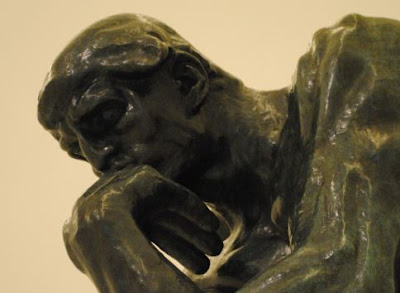The following is an edited version from a book I am working on about recovery in bipolar. One section of the book lays considerable emphasis on using critical thinking in our recovery. Thus, in previous posts, we showed how philosophy teaches us to take nothing for granted, then had a hard look at the cognitive traps we all fall into, how Sherlock Holmes and Charles Darwin serve as models of observation and reasoning, and how improving our word power can save the day. Then, in two posts, we had a look at the thinking hacks used by lawyers and engineers and historians. In this post, we continue with some short takes on the hacks used in a number of other professions ...
Statistics
On the eve the 2016 US Presidential election, the celebrity statistician Nate Silver calculated that Donald Trump had but a one in four chance of winning. But one in four, he noted, is hardly the near-certainty we are led to believe. Conduct four computer simulations with those same odds, three turn up heads, one tail. In this case, three will be Clinton, one Trump. This turned out to be Trump’s lucky day.
Another way, of looking at it, if you were told upon getting into your car that you had a one in four chance of getting into an accident (meaning a three in four chance of safely arriving at your destination), you would choose another means of transport. On the other hand, the same odds might look encouraging when considering a surgical procedure to correct a life-threatening medical condition.
Nothing is certain. Our lives play out in probabilities. Statistics offers us options more reliable than making wild guesses. As such, it may be the most powerful thinking hack in the box. Our choices may come up wrong, but we can take comfort in having made informed ones. Odds are you will thank yourself.
Science
Let’s get real - reality doesn’t give a crap what any of us think. If science has the effrontery to contest a cherished opinion of yours, then at least have the courtesy to listen. If still not satisfied, summon the discipline to put in the work and frame a coherent and respectful rebuttal, together with the humility to acknowledge that its practitioners were the ones who scored 1600 on their SATs, not you. In the poisonous political climate we’re living in, science is enduring its greatest attack since the Dark Ages. Research budgets are being slashed, government scientists are being censored, and legitimate findings being ridiculed. But at the end of the day, no matter what, reality will go on, impervious to our conceits, ever ready to make fools of us all.
Psychology/Psychiatry
Don’t count on anyone behaving rationally. This includes yourself. This insight was Freud’s gift to the world. Thinking with our emotions is the wild card in the behavioral deck and we have to account for all 52 of them.
Economics/Accounting/Finance
Three words, “follow the money.” If it’s flowing away from you, you may need to take responsibility and change your habits. Another possibility is you’re being hoodwinked. Since 1981, the money has been inexorably trickling up (and away from us), and - being the irrational beings we are - we keep voting in those responsible. Economics has been used in support of the con game, but it also provides the means to see through it. Do your homework, and vote wisely.
The Arts
Our unpredictable lives call for creative solutions. The creative brain has a logic of its own, and the artist is smart enough to follow wherever it may lead. But the product of his or her imagination emerges from a highly disciplined mind, no short-cuts, no cutting corners. Muses don’t exactly appear to those watching TV. Let that be an inspiration.
Mysticism
Seeking a reality beyond our apparent reality has always been a legitimate enterprise. Plato imagined his world of ideal forms, Pythagoras sought the mysteries of the universe in terms of the numerical and harmonic proportions. At times, the musings of theoretical physicists are indistinguishable from those of mystics. Dare to imagine another reality. That is the job of every inquiring mind.
Wrapping it up
Think like a lawyer - pessimism has its purpose. So does getting to the point and arriving at agreements. Think like an engineer - we can’t just make up our own rules. Think like a statistician - probability beats uncertainty, informed choices beat wild guesses. Think like a historian - otherwise the present makes no sense. Think like a scientist - because reality is boss. Think like a psychologist - irrationality is the norm. Think like an economist - follow the money. Think like an artist - that’s how ideas happen. Think like a mystic - our mind has no limits.
Above all: Fidelity to the facts. I know, I know - facts get in the way of a really good misconception, but in the long run you will thank yourself. Thinking, in short, is good for you, especially when we get it right.

John McManamy is the author of Living Well with Depression and Bipolar Disorder and is the publisher of the Bipolar Expert Series, available on Amazon.







No comments:
Post a Comment